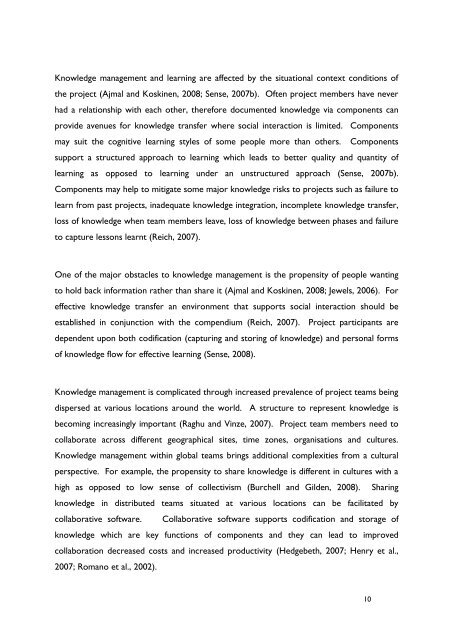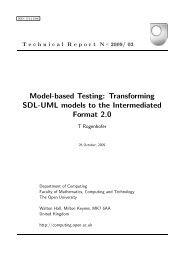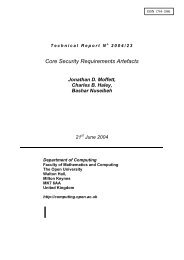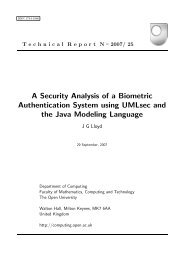Assembling The Project Compendium - Computing Technical ...
Assembling The Project Compendium - Computing Technical ...
Assembling The Project Compendium - Computing Technical ...
You also want an ePaper? Increase the reach of your titles
YUMPU automatically turns print PDFs into web optimized ePapers that Google loves.
Knowledge management and learning are affected by the situational context conditions of<br />
the project (Ajmal and Koskinen, 2008; Sense, 2007b). Often project members have never<br />
had a relationship with each other, therefore documented knowledge via components can<br />
provide avenues for knowledge transfer where social interaction is limited. Components<br />
may suit the cognitive learning styles of some people more than others. Components<br />
support a structured approach to learning which leads to better quality and quantity of<br />
learning as opposed to learning under an unstructured approach (Sense, 2007b).<br />
Components may help to mitigate some major knowledge risks to projects such as failure to<br />
learn from past projects, inadequate knowledge integration, incomplete knowledge transfer,<br />
loss of knowledge when team members leave, loss of knowledge between phases and failure<br />
to capture lessons learnt (Reich, 2007).<br />
One of the major obstacles to knowledge management is the propensity of people wanting<br />
to hold back information rather than share it (Ajmal and Koskinen, 2008; Jewels, 2006). For<br />
effective knowledge transfer an environment that supports social interaction should be<br />
established in conjunction with the compendium (Reich, 2007). <strong>Project</strong> participants are<br />
dependent upon both codification (capturing and storing of knowledge) and personal forms<br />
of knowledge flow for effective learning (Sense, 2008).<br />
Knowledge management is complicated through increased prevalence of project teams being<br />
dispersed at various locations around the world. A structure to represent knowledge is<br />
becoming increasingly important (Raghu and Vinze, 2007). <strong>Project</strong> team members need to<br />
collaborate across different geographical sites, time zones, organisations and cultures.<br />
Knowledge management within global teams brings additional complexities from a cultural<br />
perspective. For example, the propensity to share knowledge is different in cultures with a<br />
high as opposed to low sense of collectivism (Burchell and Gilden, 2008). Sharing<br />
knowledge in distributed teams situated at various locations can be facilitated by<br />
collaborative software. Collaborative software supports codification and storage of<br />
knowledge which are key functions of components and they can lead to improved<br />
collaboration decreased costs and increased productivity (Hedgebeth, 2007; Henry et al.,<br />
2007; Romano et al., 2002).<br />
10










